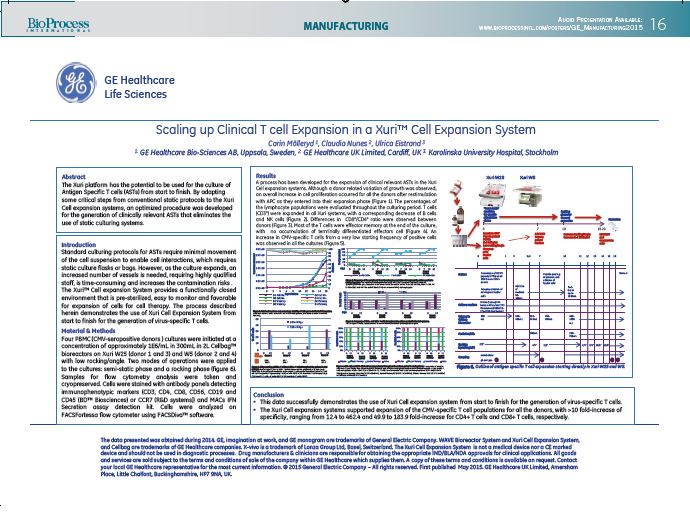Voices of Biotech
Podcast: MilliporeSigma says education vital to creating unbreakable chain for sustainability
MilliporeSigma discusses the importance of people, education, and the benefits of embracing discomfort to bolster sustainability efforts.

Sponsored by GE HealthCare Technologies
Administration of antigen-specific T cells (ASTs), in particular for viral infections in transplantation, is one of the key focuses in immunotherapy. The Xuri™ Cell Expansion System can be used as an alternative to static cell culture methods for the stimulation and expansion of ASTs.
The process described here demonstrates the use of the Xuri Cell Expansion System from the initiation of culture to the generation of virus-specific T cells. This includes a semi-static phase for antigen stimulation, a rocking phase for cell expansion, and a feeding regimen with perfusion to maintain optimal culture conditions in a single closed environment.
The data shows that Xuri Cell Expansion Systems provide a functionally dynamic environment suitable for the expansion of antigen-specific T cells. Donor to donor heterogeneity was seen phenotypically and in the fold expansion of the cultures. Nevertheless, most of the T cells at the end of the culture were memory T cells, with no accumulation of terminally differentiated effector cells. More importantly, an increase of IFN-g secreting virus-specific T cells was achieved for all the donors after 18 days of culture in the Xuri Cell Expansion Systems.
This study demonstrates that the initial culturing phase can be achieved using a semi-static setting and the entire culture can be performed in a single platform. By adapting some critical steps from conventional static protocols to the Xuri Cell Expansion System, a viable alternative procedure was developed that eliminates the need of static culturing systems, minimizing the risk of contamination, and manual manipulations commonly associated with open systems. It allows a cell therapy manufacturing process to scale-up in an automated, controlled, and optimized environment, without compromising the cell culture product.
You May Also Like